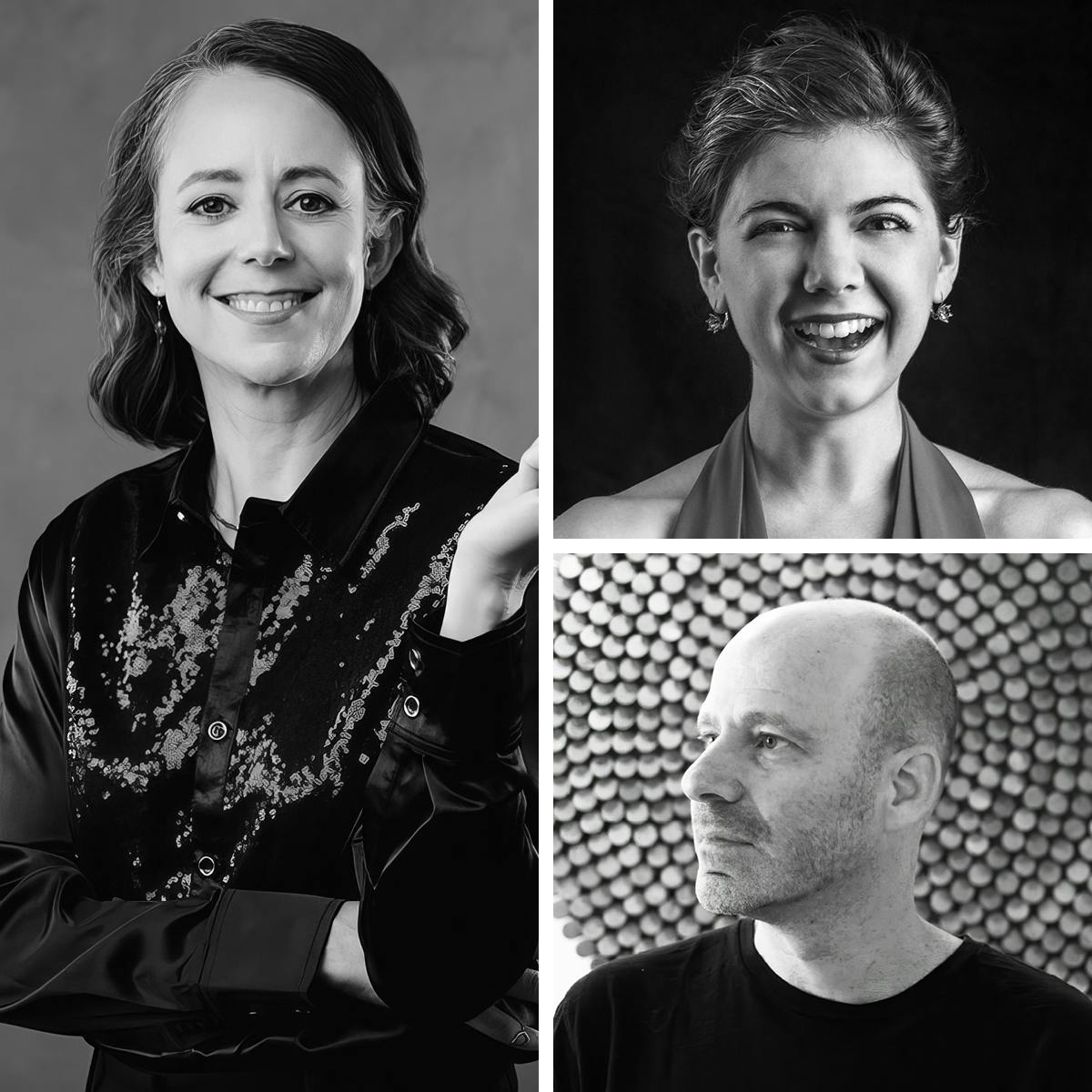All material found in the Press Releases section is provided by parties entirely independent of Musical America, which is not responsible for content.
Press Releases
Carnegie Hall Presents the American Composers Orchestra in The New Virtuoso: For Art's Sake – October 29

FOR IMMEDIATE RELEASE
Contact: Katy Salomon | Primo Artists | VP, Public Relations
katy@primoartists.com | 646.801.9406
Contact: Saratoga Schaefer | Primo Artists | Publicist
saratoga@primoartists.com | 646.470.4456
Carnegie Hall Presents the American Composers Orchestra in The New Virtuoso: For Art's Sake – October 29
Led by Mélisse Brunet in her Carnegie Hall Debut, ACO Invites Five Visionary Composers to Explore the Orchestral Impact of Virtuosic Instrumental Invention
Featuring the World Premieres of Tamar Muskal’s Square Off, Elijah Daniel Smith’s The Fall of Ideals, Mazz Swift’s Memory FIVE: Freedom Initiate for Conductrix and Orchestra, and Aaron Israel Levin’s Lear in the storm
Plus, the New York Premiere of Raven Chacon’s Inscription (Co-Commissioned by the Dallas Symphony Orchestra and the Tucson Symphony Orchestra)

"The focused attention of a robust crowd of listeners was an indication that this group’s necessary interventions have a ready, supportive local audience." – The New York Times
New York, NY (September 22, 2025) – On Wednesday, October 29, 2025 at 7:30 PM, American Composers Orchestra presents The New Virtuoso: For Art's Sake, led by Mélisse Brunet in her debut at Carnegie Hall’s Zankel Hall. The second iteration of The New Virtuoso series, the program highlights five visionary composers and performers who experiment with possibility and defy norms on their instrument – such as electronically-collected dream data, sonically reactive moving sculptures, graphic music scoring, art history, gestural conduction, and the creation of new, culturally informed instruments – thereby becoming leading technicians and innovators in the field of orchestral music
All ACO co-commissions, the works on this program include the world premieres of Aaron Israel Levin’s Lear in the storm; Mazz Swift’s Memory FIVE: Freedom Initiate for Conductrix and Orchestra; Elijah Daniel Smith’s The Fall of Ideals; and Tamar Muskal’s Square Off for voice, interactive kinetic sculpture, and orchestra featuring Lucy Fitz Gibbon and artist Daniel Rozin; as well as the New York premiere of Raven Chacon’s Inscription.
In Aaron Israel Levin’s Lear in the storm, commissioned through the EarShot Readings, the titular monarch of Shakespeare’s King Lear is shunned by his daughters and takes flight into a tempest, whose violence symbolizes the aging king’s own rage and unraveling mind. “Imagine what this elemental madness sounds like,” Levin asks the listener. “Now, imagine again. Equal parts berserk and sinister, Lear in the storm reimagines this turbulent and psychologically charged episode.” The piece’s score is characterized by restless energy, unexpected turns, and more than a touch of the absurd. Rhythmically driven sections are interrupted by fleeting moments of calm, leading to an extended vibraphone soliloquy before the final climax. Along the way, instruments that rarely step into the spotlight—piccolo, tuba, and triangles—emerge as unlikely voices, conceived as concertos in miniature, which punctuate this tempestuous orchestral landscape.
Violinist, singer, composer, and conductor Mazz Swift’s Memory FIVE: Freedom Initiate for Conductrix and Orchestra, developed via ACO’s EarShot CoLABoratory program, explores the technique of conduction developed by Butch Morris, paired with graphic score notation. The piece follows the Conductrix on a journey through place and meaning to find self-discovery and deeper expression. Conductrix is initiated into a New Alchemy. She “teases out the gold from the sludge of patriarchal, hierarchical, capitalistic, dichotomous thinking. [and asks] What are we?”
Inscription is Pulitzer Prize-winning composer Raven Chacon’s first work for full orchestra and incorporates extended techniques Chacon has developed and experimented with in his previous compositions from the past 25 years, which have become central to his compositional voice and style. Co-commissioned by the Dallas Symphony Orchestra and the Tucson Symphony Orchestra and developed via the EarShot CoLABoratory program, Inscription utilizes techniques ranging from standard Western notation conventions to graphic notation and text, creating a score that oscillates between transcriptive and prescriptive roles. The work expands the fixed nature of scores and their interpretations, seeking endless permutations from performing the permanent marks.
The Fall of Ideals is written as Elijah Daniel Smith’s response to America’s current political climate and the seeming “abandonment of the principles and enlightenment era ideals that previous generations of politicians at least pretended were their guiding stars.” Smith distorts, reinterprets, and destroys some of the most recognizable or breathtaking music of the Baroque and Classical eras “in the same way that those currently in power have distorted, reinterpreted…and destroyed the philosophical identity of this country.”
Square Off for voice, interactive kinetic sculpture, and orchestra is a bold interdisciplinary work that unites the creative voices of composer Tamar Muskal, visual artist Daniel Rozin, and opera director-librettist Daniel Kramer in a performance where music, sculpture, and text are inseparable. Together, they have created a piece that is both theatrical and deeply personal; a reflection of identity through music and image. At the center of the piece is Rozin’s celebrated Wooden Mirror, a kinetic sculpture composed of hundreds of wooden tiles that tilt to form a living, ever-changing image. Wooden Mirror becomes a second stage for the singer, Lucy Fitz Gibbon, who appears both live and as a reflected presence on the surface of the sculpture. This doubling heightens the drama, allowing the singer to embody both her immediate voice and her mediated reflection. Daniel Kramer’s lyrics trace a striking psychological journey, while Muskal’s orchestral score drives this journey with music that is energetic, urgent, and unrelenting. The orchestra propels the drama forward, its rhythmic vitality, dense textures, and relentless momentum amplifying the singer’s emotional intensity. Square Off asks its audience to witness not only the singer’s journey from self-denial to self-acceptance but also to confront their own reflection—textured, imperfect, and always human.
Program:
Wednesday, October 29, 2025 at 7:30 PM
American Composers Orchestra The New Virtuoso: For Art's Sake
Zankel Hall, Carnegie Hall | New York, NY
Link: www.carnegiehall.org/Calendar/2025/10/29/American-Composers-Orchestra-0730PM
Program:
Aaron Israel Levin – Lear in the storm [World Premiere, ACO Commission]
Mazz Swift – Memory FIVE: Freedom Initiate for Conductrix and Orchestra [World Premiere, ACO Commission, developed via EarShot CoLABoratory]
Raven Chacon – Inscription [NY Premiere, ACO Co-Commission, developed via EarShot CoLABoratory]
–Intermission–
Elijah Daniel Smith – The Fall of Ideals [World Premiere, ACO Commission]
Tamar Muskal (libretto by Daniel Kramer– Square Off for voice, interactive kinetic sculpture and orchestra [World Premiere, ACO Commission]
American Composers Orchestra
Mélisse Brunet, Conductor
Lucy Fitz Gibbon, Soprano
Daniel Rozin, Interactive Kinetic Sculpture
About American Composers Orchestra
In 1977, a collective of fearless New York City musicians came together to form the American Composers Orchestra (ACO), an ensemble dedicated to the creation, celebration, performance, and promotion of orchestral music by American composers. With nearly 50 years committed to artistry, creativity, community, and equity, ACO has blossomed into a national institution that not only cultivates and develops the careers of living composers but also provides composers a direct pipeline to partnerships with many of America’s major symphony orchestras.
In addition to its annual season, presented by Carnegie Hall since 1987, the ACO serves as a New York City hub where the most forward-thinking experimental American musicians come together to hone and realize new art by developing talent, established composers, and underrepresented voices, increasing the regional, national, and international awareness of the infinite variety of American orchestral music.
ACO produces national educational programs for all ages, and composer advancement programs to foster a community of creators, audience, performers, collaborators, and funders – all dedicated to American composition.
To date, ACO has performed music by 800 American composers, including over 350 world premieres and newly commissioned works. Recent and notable commissioned composers include John Luther Adams, Andy Akiho, Clarice Assad, Carlos Bandera, Courtney Bryan, Valerie Coleman, Dai Wei, Du Yun, inti figgis-vizueta, Marcus Gilmore, Vijay Iyer, Yvette Janine Jackson, Joan La Barbara, Steve Lehman, Tania León, Paula Matthusen, Trevor New, Mendi Keith Obadike, Ellen Reid, Daniel Bernard Roumain, Carlos Simon, Henry Threadgill, and many more.
Now encompassing all of ACO’s composer advancement initiatives, EarShot is the first ongoing, systematic program for developing relationships between composers and orchestras on the national level. Through orchestral readings, CoLABoratory fellowships, consortium commissions, publishing, and professional development, EarShot ensures a vibrant musical future by investing in creativity today. Serving over 350 composers since inception, ACO Readings in NYC began in 1991, and since 2008, national Readings have been offered in partnership with orchestras across the country in collaboration with American Composers Forum, the League of American Orchestras, and New Music USA. EarShot Readings composers have gone on to win every major composition award, including the Pulitzer, GRAMMY®, Grawemeyer, American Academy of Arts and Letters, and Rome Prizes.
ACO has received numerous awards for its work, including those from the American Academy of Arts and Letters and from BMI Foundation, Inc., recognizing the orchestra’s outstanding contribution to American music. ASCAP has awarded ACO its annual prize for adventurous programming 35 times, singling out ACO as “the orchestra that has done the most for new American music in the United States.” ACO received the inaugural MetLife Award for Excellence in Audience Engagement, and a proclamation from the New York City Council. Learn more at www.americancomposers.org.
*Mélisse Brunet by Mothwing Photography, Lucy Fitz Gibbon by Steve Riskind, Daniel Rozin by Tamar Muskal
# # #
Raven Chacon’s Inscription was co-commissioned by the Dallas Symphony Orchestra with the support of the Norma and Don Stone New Music Fund, Tucson Symphony Orchestra with the support of Shirley Chann, and American Composers Orchestra with the support of Elizabeth and Justus Schlichting and the 2025-26 Commission Club. Inscription was developed through the American Composers Orchestra’s EarShot CoLABoratory program, with lead funding from TD Charitable Foundation.
The commission of Square Off by Tamar Muskal with responsive kinetic sculpture by Daniel Rozin is made possible by the New York State Council on the Arts with the support of the Office of the Governor and the New York State Legislature and the 2025-26 Commission Club.
Elijah Daniel Smith’s The Fall of Ideals was commissioned by the American Composers Orchestra with the support of Elizabeth and Justus Schlichting and the 2025-26 Commission Club.
The commission of Mazz Swift’s Memory FIVE: Freedom Initiate is made possible by the New York State Council on the Arts with the support of the Office of the Governor and the New York State Legislature and the 2025-26 Commission Club, and developed through the American Composers Orchestra’s EarShot CoLABoratory program, with lead funding from TD Charitable Foundation with additional support from the Jerome Foundation.
Aaron Israel Levin’s Lear In the Storm was commissioned by the American Composers Orchestra with support from the 2025-26 Commission Club.
American Composers Orchestra is grateful to the many organizations that make its programs possible including Arthur F. & Alice E. Adams Charitable Fund, Altman Foundation, Amphion Foundation, Benevity, Aaron Copland Fund for Music, BMI Foundation, BMI, Inc., Charity Navigator's Giving Basket, Cheswatyr Foundation, Edward T. Cone Foundation, Communities Foundation of Texas, The Gladys Krieble Delmas Foundation, Alice M. Ditson Fund of Columbia University, Fan Fox and Leslie R. Samuels Foundation, Ford Foundation’s Good Neighbor Committee, Give Lively, Francis B. Goelet Charitable Trust, Fromm Music Foundation, Steven R. Gerber Trust, G. Schirmer/Wise Music Foundation, The Hearst Foundation, Howard Gilman Foundation, Jephson Educational Trusts, Jerome Foundation, MacMillan Family Foundation, Mellon Foundation, New Music USA’s Organization Fund, The New York Community Trust (Musical Arts Fund, Clara Lewisohn Rossin Trust, and Edward and Sally Van Lier Fund), Pacific Harmony Foundation, Paypal Giving Fund, Rexford Fund, Sphinx Venture Fund, TD Charitable Foundation, Turrell Fund, UKOGF Foundation, Virginia B. Toulmin Foundation.
Corporate gifts to match employee contributions are made by Goldman Sachs, Deutsche Bank, Triton Container International Incorporated of North America, and Neiman Marcus.
Public funds are provided by the New York City Department of Cultural Affairs in partnership with the City Council, and the New York State Council on the Arts with the support of Governor Kathy Hochul and the New York State Legislature, Office of Brooklyn Borough President Reynoso, and the National Endowment for the Arts.






 FEATURED JOBS
FEATURED JOBS

 RENT A PHOTO
RENT A PHOTO


